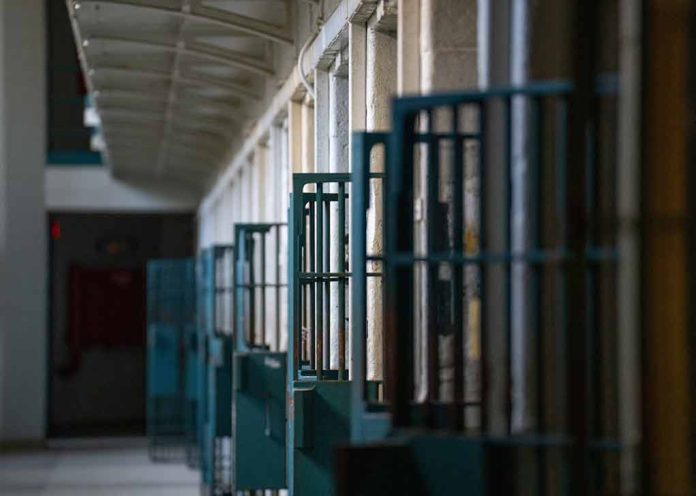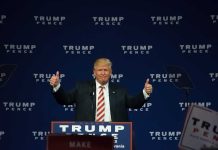
Former President Donald Trump threatens Meta CEO Mark Zuckerberg with life imprisonment over alleged election interference, raising questions about social media’s role in democracy and the boundaries of political rhetoric.
At a Glance
- Trump accuses Zuckerberg of plotting to influence the 2020 election in favor of Biden
- Trump’s new book “Save America” includes threats of imprisonment for Zuckerberg
- The accusations revolve around Meta’s content moderation and election infrastructure funding
- Trump’s claims lack legal basis and reflect ongoing election fraud narratives
Trump’s Accusations and Threats
In his latest book “Save America,” former President Donald Trump has reignited controversy by threatening Meta CEO Mark Zuckerberg with life imprisonment. Trump alleges that Zuckerberg conspired to influence the 2020 election in favor of Joe Biden, making bold claims about Facebook’s role in what he perceives as election interference.
Trump’s accusations center around Zuckerberg’s financial contributions to election infrastructure during the COVID-19 pandemic. The former president claims that these funds, approximately $420 million, were used to manipulate the election outcome. Trump writes in his book, “We are watching him closely, and if he does anything illegal this time he will spend the rest of his life in prison — as will others who cheat in the 2024 Presidential Election.”
Donald Trump has a coffee table book out next week and it includes a threat to send Mark Zuckerberg to prison. https://t.co/ONs9ezXDJl
— VANITY FAIR (@VanityFair) August 29, 2024
Legal and Political Context
While Trump’s threats are severe, they lack legal foundation. The U.S. justice system operates independently of presidential directives, and imprisonment requires due process and evidence of criminal activity. Trump’s statements appear to be more political rhetoric than actionable legal threats.
“We are watching him closely, and if he does anything illegal this time he will spend the rest of his life in prison — as will others who cheat in the 2024 Presidential Election.” – Donald Trump
These accusations fit into Trump’s broader narrative of election fraud, which he has maintained since his loss in 2020. Despite numerous court cases and recounts finding no evidence of widespread fraud, Trump continues to use this narrative to galvanize his base and challenge the legitimacy of the 2020 election results.
In a post on Truth Social on Tuesday, the former president threatened to put “election fraudsters” in jail, name checking Mark Zuckerberg in the process. https://t.co/PV5KlNUc5i
— Fast Company (@FastCompany) July 9, 2024
Impact on Public Discourse
Trump’s statements have reignited debates about the role of social media in elections and the extent of tech companies’ influence on democratic processes. While concerns about social media’s impact on elections are valid, Trump’s extreme rhetoric risks further polarizing an already divided electorate.
“He told me there was nobody like Trump on Facebook. But at the same time, and for whatever reason, steered it against me.” – Donald Trump
The accusations against Zuckerberg and Meta come at a time when the company has been trying to appease critics on both sides of the political aisle. Zuckerberg recently wrote a letter to the House Judiciary Committee addressing concerns about content moderation, particularly regarding COVID-19 information and the Hunter Biden laptop story. However, these efforts seem to have done little to sway Trump’s opinion or soften his rhetoric.
Implications for the 2024 Election
As the 2024 presidential race approaches, Trump’s accusations and threats raise concerns about the potential for increased tensions and distrust in the electoral process. His statements could influence his supporters’ perceptions of election integrity and potentially impact voter behavior.
The controversy also highlights the ongoing challenges faced by social media platforms in balancing free speech with the need to combat misinformation and protect election integrity. As we move closer to the 2024 election, the debate over the role of tech companies in shaping political discourse is likely to intensify.
In conclusion, while Trump’s threats against Zuckerberg lack legal merit, they serve as a stark reminder of the complex interplay between social media, politics, and public opinion in modern democracy. As the nation prepares for another contentious election cycle, the need for clear, fact-based discourse and robust safeguards for election integrity has never been more critical.
Sources
- Trump Threatens to Jail Mark Zuckerberg for Life
- In New Coffee-Table Book, Trump Threatens to Send Mark Zuckerberg to Prison for “the Rest of His Life”
- Trump threatens to throw Mark Zuckerberg in prison for life in new book
- New Trump book defends 2018 Putin meeting, taunts rivals and threatens to imprison Meta’s Zuckerberg
- Trump threatens Meta CEO Mark Zuckerberg with life in prison in new book ‘Save America’









